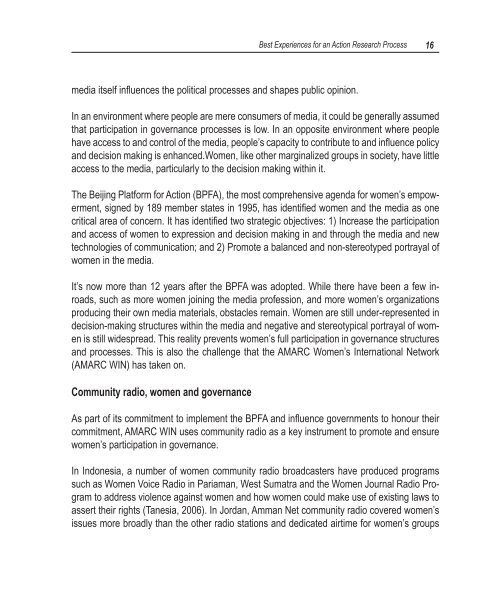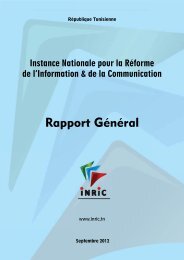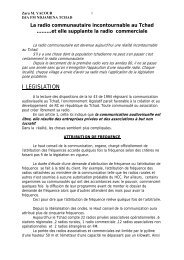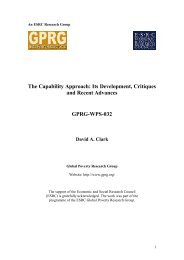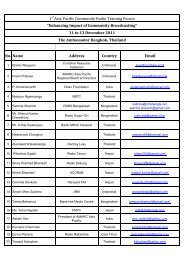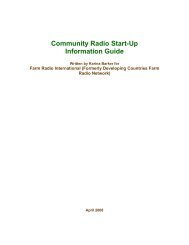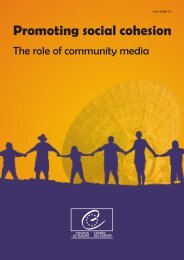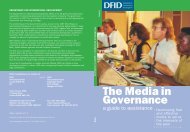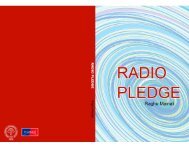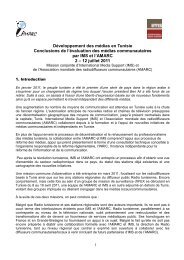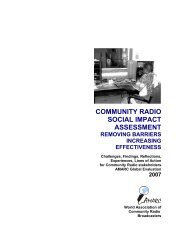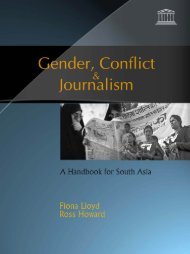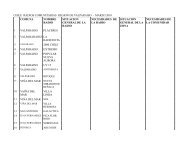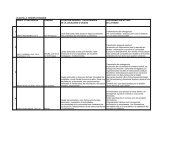Women's Empowerment and Good Governance Through - amarc
Women's Empowerment and Good Governance Through - amarc
Women's Empowerment and Good Governance Through - amarc
You also want an ePaper? Increase the reach of your titles
YUMPU automatically turns print PDFs into web optimized ePapers that Google loves.
Best Experiences for an Action Research Process 16<br />
media itself influences the political processes <strong>and</strong> shapes public opinion.<br />
In an environment where people are mere consumers of media, it could be generally assumed<br />
that participation in governance processes is low. In an opposite environment where people<br />
have access to <strong>and</strong> control of the media, people’s capacity to contribute to <strong>and</strong> influence policy<br />
<strong>and</strong> decision making is enhanced.Women, like other marginalized groups in society, have little<br />
access to the media, particularly to the decision making within it.<br />
The Beijing Platform for Action (BPFA), the most comprehensive agenda for women’s empowerment,<br />
signed by 189 member states in 1995, has identified women <strong>and</strong> the media as one<br />
critical area of concern. It has identified two strategic objectives: 1) Increase the participation<br />
<strong>and</strong> access of women to expression <strong>and</strong> decision making in <strong>and</strong> through the media <strong>and</strong> new<br />
technologies of communication; <strong>and</strong> 2) Promote a balanced <strong>and</strong> non-stereotyped portrayal of<br />
women in the media.<br />
It’s now more than 12 years after the BPFA was adopted. While there have been a few inroads,<br />
such as more women joining the media profession, <strong>and</strong> more women’s organizations<br />
producing their own media materials, obstacles remain. Women are still under-represented in<br />
decision-making structures within the media <strong>and</strong> negative <strong>and</strong> stereotypical portrayal of women<br />
is still widespread. This reality prevents women’s full participation in governance structures<br />
<strong>and</strong> processes. This is also the challenge that the AMARC Women’s International Network<br />
(AMARC WIN) has taken on.<br />
Community radio, women <strong>and</strong> governance<br />
As part of its commitment to implement the BPFA <strong>and</strong> influence governments to honour their<br />
commitment, AMARC WIN uses community radio as a key instrument to promote <strong>and</strong> ensure<br />
women’s participation in governance.<br />
In Indonesia, a number of women community radio broadcasters have produced programs<br />
such as Women Voice Radio in Pariaman, West Sumatra <strong>and</strong> the Women Journal Radio Program<br />
to address violence against women <strong>and</strong> how women could make use of existing laws to<br />
assert their rights (Tanesia, 2006). In Jordan, Amman Net community radio covered women’s<br />
issues more broadly than the other radio stations <strong>and</strong> dedicated airtime for women’s groups


